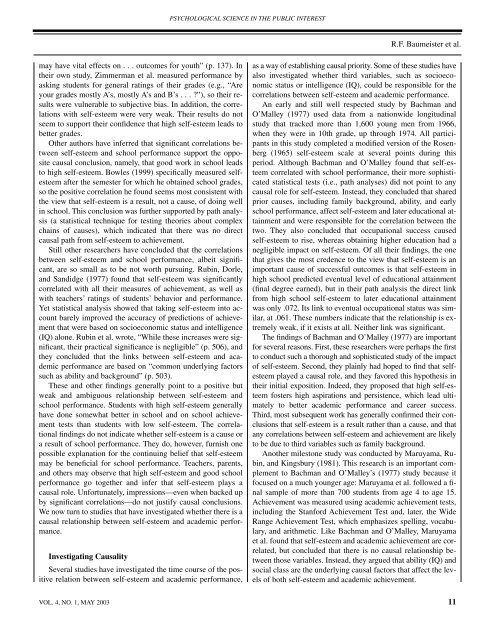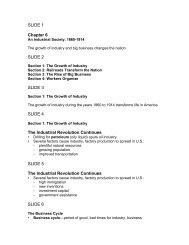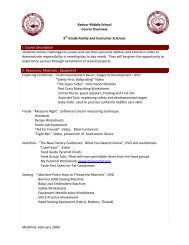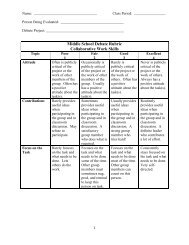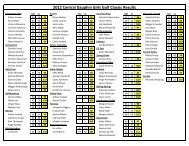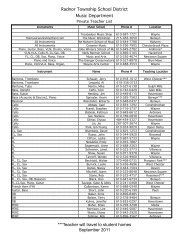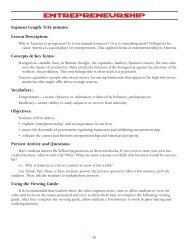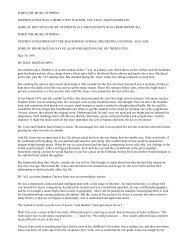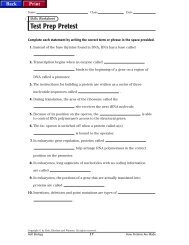Self-Esteem and Student Achievement
Self-Esteem and Student Achievement
Self-Esteem and Student Achievement
Create successful ePaper yourself
Turn your PDF publications into a flip-book with our unique Google optimized e-Paper software.
PSYCHOLOGICAL SCIENCE IN THE PUBLIC INTERESTR.F. Baumeister et al.may have vital effects on . . . outcomes for youth” (p. 137). Intheir own study, Zimmerman et al. measured performance byasking students for general ratings of their grades (e.g., “Areyour grades mostly A’s, mostly A’s <strong>and</strong> B’s . . . ?”), so their resultswere vulnerable to subjective bias. In addition, the correlationswith self-esteem were very weak. Their results do notseem to support their confidence that high self-esteem leads tobetter grades.Other authors have inferred that significant correlations betweenself-esteem <strong>and</strong> school performance support the oppositecausal conclusion, namely, that good work in school leadsto high self-esteem. Bowles (1999) specifically measured selfesteemafter the semester for which he obtained school grades,so the positive correlation he found seems most consistent withthe view that self-esteem is a result, not a cause, of doing wellin school. This conclusion was further supported by path analysis(a statistical technique for testing theories about complexchains of causes), which indicated that there was no directcausal path from self-esteem to achievement.Still other researchers have concluded that the correlationsbetween self-esteem <strong>and</strong> school performance, albeit significant,are so small as to be not worth pursuing. Rubin, Dorle,<strong>and</strong> S<strong>and</strong>idge (1977) found that self-esteem was significantlycorrelated with all their measures of achievement, as well aswith teachers’ ratings of students’ behavior <strong>and</strong> performance.Yet statistical analysis showed that taking self-esteem into accountbarely improved the accuracy of predictions of achievementthat were based on socioeconomic status <strong>and</strong> intelligence(IQ) alone. Rubin et al. wrote, “While these increases were significant,their practical significance is negligible” (p. 506), <strong>and</strong>they concluded that the links between self-esteem <strong>and</strong> academicperformance are based on “common underlying factorssuch as ability <strong>and</strong> background” (p. 503).These <strong>and</strong> other findings generally point to a positive butweak <strong>and</strong> ambiguous relationship between self-esteem <strong>and</strong>school performance. <strong>Student</strong>s with high self-esteem generallyhave done somewhat better in school <strong>and</strong> on school achievementtests than students with low self-esteem. The correlationalfindings do not indicate whether self-esteem is a cause ora result of school performance. They do, however, furnish onepossible explanation for the continuing belief that self-esteemmay be beneficial for school performance. Teachers, parents,<strong>and</strong> others may observe that high self-esteem <strong>and</strong> good schoolperformance go together <strong>and</strong> infer that self-esteem plays acausal role. Unfortunately, impressions—even when backed upby significant correlations—do not justify causal conclusions.We now turn to studies that have investigated whether there is acausal relationship between self-esteem <strong>and</strong> academic performance.Investigating CausalitySeveral studies have investigated the time course of the positiverelation between self-esteem <strong>and</strong> academic performance,as a way of establishing causal priority. Some of these studies havealso investigated whether third variables, such as socioeconomicstatus or intelligence (IQ), could be responsible for thecorrelations between self-esteem <strong>and</strong> academic performance.An early <strong>and</strong> still well respected study by Bachman <strong>and</strong>O’Malley (1977) used data from a nationwide longitudinalstudy that tracked more than 1,600 young men from 1966,when they were in 10th grade, up through 1974. All participantsin this study completed a modified version of the Rosenberg(1965) self-esteem scale at several points during thisperiod. Although Bachman <strong>and</strong> O’Malley found that self-esteemcorrelated with school performance, their more sophisticatedstatistical tests (i.e., path analyses) did not point to anycausal role for self-esteem. Instead, they concluded that sharedprior causes, including family background, ability, <strong>and</strong> earlyschool performance, affect self-esteem <strong>and</strong> later educational attainment<strong>and</strong> were responsible for the correlation between thetwo. They also concluded that occupational success causedself-esteem to rise, whereas obtaining higher education had anegligible impact on self-esteem. Of all their findings, the onethat gives the most credence to the view that self-esteem is animportant cause of successful outcomes is that self-esteem inhigh school predicted eventual level of educational attainment(final degree earned), but in their path analysis the direct linkfrom high school self-esteem to later educational attainmentwas only .072. Its link to eventual occupational status was similar,at .061. These numbers indicate that the relationship is extremelyweak, if it exists at all. Neither link was significant.The findings of Bachman <strong>and</strong> O’Malley (1977) are importantfor several reasons. First, these researchers were perhaps the firstto conduct such a thorough <strong>and</strong> sophisticated study of the impactof self-esteem. Second, they plainly had hoped to find that selfesteemplayed a causal role, <strong>and</strong> they favored this hypothesis intheir initial exposition. Indeed, they proposed that high self-esteemfosters high aspirations <strong>and</strong> persistence, which lead ultimatelyto better academic performance <strong>and</strong> career success.Third, most subsequent work has generally confirmed their conclusionsthat self-esteem is a result rather than a cause, <strong>and</strong> thatany correlations between self-esteem <strong>and</strong> achievement are likelyto be due to third variables such as family background.Another milestone study was conducted by Maruyama, Rubin,<strong>and</strong> Kingsbury (1981). This research is an important complementto Bachman <strong>and</strong> O’Malley’s (1977) study because itfocused on a much younger age: Maruyama et al. followed a finalsample of more than 700 students from age 4 to age 15.<strong>Achievement</strong> was measured using academic achievement tests,including the Stanford <strong>Achievement</strong> Test <strong>and</strong>, later, the WideRange <strong>Achievement</strong> Test, which emphasizes spelling, vocabulary,<strong>and</strong> arithmetic. Like Bachman <strong>and</strong> O’Malley, Maruyamaet al. found that self-esteem <strong>and</strong> academic achievement are correlated,but concluded that there is no causal relationship betweenthose variables. Instead, they argued that ability (IQ) <strong>and</strong>social class are the underlying causal factors that affect the levelsof both self-esteem <strong>and</strong> academic achievement.VOL. 4, NO. 1, MAY 2003 11


